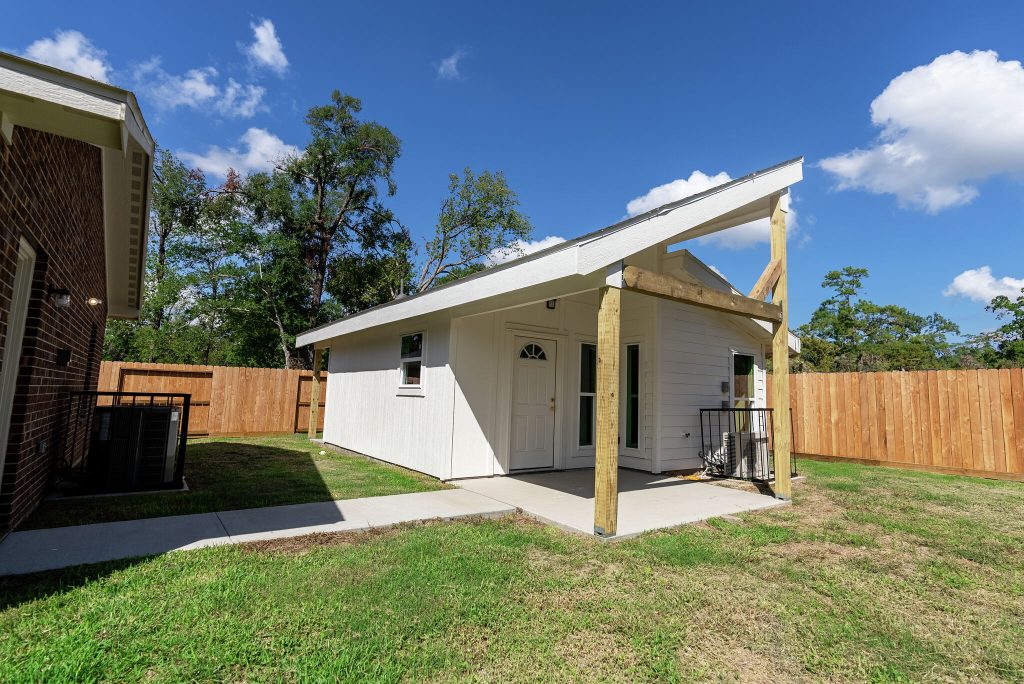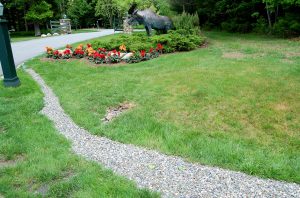Ashley Allen, the trust’s executive director, said the money would be used to pilot a number of new affordable development types she hopes will gain traction with both Houstonians and donors.
Think housing stabilization efforts, which would help families repair their homes and minimize their taxes; commercial property, which would lower the rent burden for small local businesses; and tiny homes, which she believes could sell for around $55,000 to $65,000.
COMMUNITY LAND TRUST: Affordable housing program in danger because critics say it’s too slow at securing homes
Allen said when she got the call that the grant came without restrictions, her mind went immediately to a number of creative affordable housing solutions that had fallen outside of the guidelines for her current funds.
“While we have unrestricted dollars, let’s try to do something a little different,” she said.
An exciting start and stumbling block
Since 2019, the Houston Community Land Trust has been heralded as a way to create permanently affordable homes throughout the city.
It partners with prospective homeowners on properties of their choosing and makes those homes affordable by moving the land they sit upon into a trust. The purchase price is dramatically lower since the homebuyer is only purchasing the structure.
The trust leases the land to the homeowners for $50 a month for 99 years at a time. Since owners do not own or pay taxes on the land, the family’s tax bills are stabilized since the tax on the land will most likely climb as a neighborhood grows in demand.
This strategy brings homeownership within reach of people making as little as 40 percent of the area’s median income or $35,000 for a family of four. It also makes those homes permanently affordable by capping how much a home’s value could appreciate a year at 1.25% annually.
While the cap limits how much a family could make by selling the home, it also ensures the home will be affordable for future buyers, a departure from other homeownership programs that usually make housing affordable for only a specific period of time.
HARRIS COUNTY LAND TRUST: Harris County is moving families into permanently affordable homes through community land trust
Between 2018 and 2021, the city allocated $60 million total to the land trust. Jesús Vassallo-Fernandez followed the news with interest. He leads the Affordable Housing Lab, a joint venture between the Rice School of Architecture, where he teaches, and the Kinder Institute for Urban Research.
In his view, Houston has historically had an anemic affordable housing ecosystem in which neither the housing authority nor nonprofits are developing the number of subsidized units seen in other major cities. He said the city has instead relied, to a worrying degree, upon naturally occurring affordable housing, which is disappearing as the city grows more expensive.
The city has also relied, to a lesser degree, on developer incentives to make housing affordable for a number of years. Many of those affordability agreements are expiring soon.
Permanently affordable housing, with city backing, could change the landscape, Vassallo-Fernandez thought. He reached out to suggest the organization look into adding different types of housing to the trust, such as multifamily developments and housing that was somewhere between multifamily and single-family. One example is a condo-sized bungalow that could provide smaller households more affordability than a typical house.
Vassallo-Fernandez’s ideas have helped shape Allen’s plans for the MacKenzie Scott grant, which comes at a crucial time for the organization.
The Houston Land Trust’s ambitious start stumbled when it took longer to get families into homes than the city had hoped. Three years into the program, roughly 100 families used the trust to buy homes, and another 90 were in the pipeline. The city had wanted 1,100 homes within five years.
In early 2023, the city allocated roughly $30 million away from the program toward an initiative to build entire subdivisions from scratch. (The program also recently took a hit when it relinquished $60 million in Harvey Recovery funds back to the state because it did not think it would meet its spending deadline.) With only enough funds left to cover those already in the process of buying a home with the land trust, the group closed its doors to new applications.
Those funds have now all been expended, Allen said, leaving a dozen people on the waitlist in limbo.
A way to stabilize family homes
But at the same time in early 2023, the Houston Community Land Trust received a call from an anonymous potential donor, whom Allen said “reached out of the clear blue sky.” The caller asked about the land trust’s model and didn’t reach out again until this summer to notify Allen of the award.
Other community land trusts across the country have also received donations from the Mackenzie Scott Foundation in this round of grants. In the past two months, the San Francisco Community Land Trust announced a $20 million donation, Homestead Community Land Trust in Seattle announced a $10 million donation and Grounded Solutions Network, which works with community land trusts and other affordable housing strategies across the country, announced a $12 million donation.
Right now, the Houston Community Land Trust is in the process of setting up partnerships to spend the $5 million grant. Once those are finalized, they’ll start spending the money.
MISSING MIDDLE: Houston considering rule changes to fill ‘missing middle’ with new triplexes, fourplexes
For example, Fifth Ward Redevelopment Corporation, which is already helping homeowners repair their homes, is discussing working with the trust to stabilize homeowners. With existing homeowners, Houston Community Land Trust would provide money needed for repairs in exchange for transferring the land a home sits on into the trust. Repairs could otherwise provide an inadvertent financial burden on homeowners with limited incomes by significantly raising the home’s value, Allen explained.
The redevelopment corporation could provide education and expert guidance, determine the scope of work for what needs to be done, get estimates from multiple legitimate contractors to find the most affordable option and supervise the rehabilitation.
If a homeowner needs more repairs than the community land trust can cover, the redevelopment corporation could help talk to lenders about a home improvement loan that would fit within the household’s budget, said Mayra Bontemps, the redevelopment corporation’s chief real estate officer.
Bontemps called the prospect of such a program exciting. “There aren’t a lot of programs to make sure we maintain the affordability of a home that has been in their family for a while,” she said, and a land trust partnership would help keep families with roots in Fifth Ward in the neighborhood and protect them from displacement.
Don Edward-Garcia’s family has lived in his Fifth Ward home for three generations; his earliest memories include playing with his older brothers and climbing trees in the yard.
His mother died in 1989. After his father died a decade later, he moved back into the house and paid the taxes. But paying for taxes on his fixed income has become harder as property values have risen. Edward-Garcia, 72, is now on a payment plan to dedicate roughly $200 of his $600 a month of social security to taxes.
He still prefers to maintain ownership of the land. But if his rising taxes lead to a situation where the trust was the only way to keep the home, he said he would consider it. It is important to him for the house to stay in his family, Edward-Garcia said, so he could one day pass it on to his nephew.
Other ways to think outside of the box
The trust is also looking into partnering with Prairie View A&M and Houston Habitat for Humanity. The organizations recently built an accessory dwelling unit, or small standalone living structure, in the backyard of another home. The 440-square-foot design is storm-resilient and features a skylight and two porches. Allison Hay, executive director, said the materials and permits cost less than $40,000.
Allen is interested in replicating the design in small clusters around shared courtyards. Such homes would fit in with Vassallo-Fernandez’s vision of the land trust incorporating housing types outside of the traditional single-family home. They can also make use of land parcels that are not large enough for a traditional home.
HABITAT ADU: Alabama leads nation in building windstorm-resilient homes. Here’s what other Gulf states can learn.
Allen is also looking into the multifamily co-op, another type of housing that Vassallo-Fernandez champions. In that type of affordable housing, instead of paying rent, residents build equity in the property by purchasing shares.
When they are ready to move, they could sell their share back to the co-op to take out their equity, and the next residents would then purchase that share through monthly payments. Allen said it’s still unclear whether this type of property would be piloted with this round of funding or in the future because of the high cost of purchasing a multifamily building.
Those discussing the pilots hope they fight the effects of rising property costs and gentrification, and provide a model for other cities.
“There’s no reason we’re not the leader in affordable housing,” Allen said.
Read the full article here




















